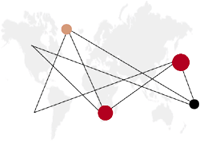
| RESOURCES | |
|
HIGHER EDUCATION KEY TO KNOWLEDGE ECONOMY World Bank President Launches Report by Independent Task Force
Higher Education in Developing Countries: Peril and Promise marks the final report of the Task Force on Higher Education and Society, an autonomous body of specialists convened two years ago by UNESCO and the World Bank. The study was launched at the World Bank’s Human Development Week taking place in Washington, DC from February 28 through today.
World Bank President James D. Wolfensohn said in launching the Task Force’s report. In its report, the Task Force not only articulates compelling reasons for renewed public interest in supporting higher education, but also suggests specific areas for emphasis by developing countries. These range from improving scientific and technological capacity, to respecting principles of good governance, to supporting both general and specialized education. The Task Force secured the valuable insights of some of the world’s foremost authorities in higher education, and was composed of 14 members from 13 countries. The team received support from several national governments, private foundations, corporations, and universities. The Harvard Institute for International Development served as home to the Task Force Secretariat. The Task Force sounds an alarm that higher education in developing countries is in crisis: it is generally overcrowded, chronically under-funded, poorly managed, and beset with inadequate faculty and curricula. The report underscores the need for a holistic approach to education policy, emphasizing that poor countries should view higher education as a vital part of their overall human development strategy. It argues that advanced education is crucial for developing countries if they hope to engender the capacity required to overcome serious problems, such as hunger, persistent poverty, environmental degradation, and economic under-performance. Demand for higher education is rising rapidly, compounding the challenges for countries that hope to improve quality, reduce public cost, and increase access to all strata. The Task Force report advocates a policy of systemic reform emphasizing planned diversity, where both public and private actors co-ordinate their actions within a clear strategic framework. Mamphela Ramphele, incoming World Bank Managing Director for Human Development, Task Force Co-Chair, and Vice Chancellor of the University of Cape Town, South Africa expressed her belief that higher education is important to poverty reduction: ‘There is no way we can succeed in the eradication of poverty if the developing world is not a part of knowledge creation, its dissemination and utilization to promote innovation. Higher education is a critical factor in making this possible and must be part of any development strategy. ’To learn more about the World Bank’s Human Development Week, visit http://www.worldbank.org/ Andrew Kircher |